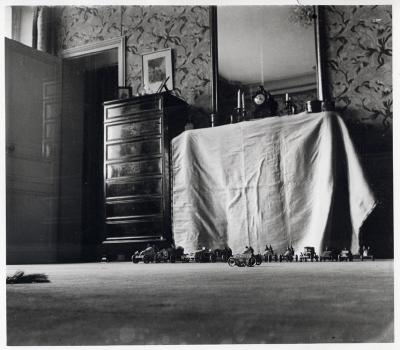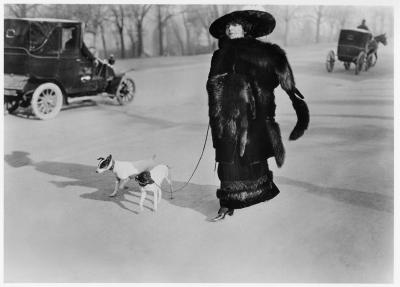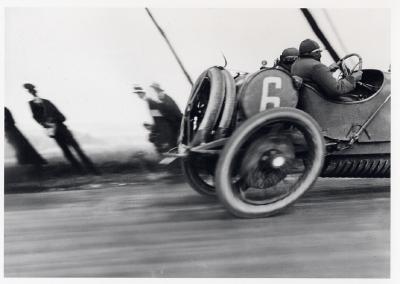Lartigue at the Hayward Gallery
This exhibition of the acclaimed French photographer, Jacques Henri Lartigue, seems like a leap through the twentieth century from the moment the six-year old boy was given his camera in 1901.

In my bedroom, my collection of racing cars; 40 rue Cortambert, Paris 1905; Photograph JH Lartigue; © Ministère de la Culture-France/A.A.J.H.L.
It was bigger than he was. His father was one of France's richest men and the delicate son was to live to ninety-two. He was indulged by being both delicate and privileged and this was to set his life forever along the paths of leisure and self-appointment but his talent and commitment with the camera means that the rest of us can enjoy a visual stream of consciousness full of the fun and spontaneity always missing from photographs taken before the First World War. There are pictures of his bedroom from lying-on-your-front-level, his collection of racing cars lined up for the ready; scenes of real life adventure in early aeroplanes piloted by his brother and adolescent adventure in the capturing of women parading in Parisian parks like exotic birds. (Cecil Beaton must surely have seen these before he conjured the costumes for My Fair Lady).

Avenue du Bois, 1911; Gelatin silver print; Photograph JH Lartigue; © Ministère de la Culture-France/A.A.J.H.L.
Lartigue also kept a diary from childhood, never missing a day or a detail: "I am always a little worried when I write this little journal because every day so many things come and go, amusing and enchanting me and everything must be digested...It's impossible and there is too much to tellâ€). The exhibition uses such excerpts to illustrate some of the pages from a hundred albums that he held by the end. Also in the show there are 120 framed images. They seem to confirm a single motivation in this gilded life: to record each moment before it had gone – “the obsessive desire...to practice taxidermy on happiness†– loathing to give up childhood and all its freedom from responsibility. This would persist throughout his life, making a commitment to one woman, for instance, a hopeless cause. The eye is a camera and this is an essentially impersonal one: relatives are invited to perform, lovers to look back and the life is devoured by Lartigue's quixotic gaze. He described it himself with a touch of self-reproach: “(I'm) a sort of being come down from another planet just to enjoy the showâ€. It is a celebration but also a consummation. It's all so lightheaded but his boast in the capture, his fantastic opportunistic eye, is without comparison. For this reason, Lartigue occupies a unique genre in the history of photography for it is unadulterated by social event or conscience, the usual concerns with earning an income, or something so vulgar as ambition. Any ambition, thankfully, went into his painting, where his serious sense of self-worth was astonishingly misplaced, given such an eye.

A.C.F. (Automobile Club de France) Grand Prix, Delage racing car; Dieppe, 26 June 1912; Photograph JH Lartigue; © Ministère de la Culture-France/A.A.J.H.L.
After the Great War, Lartigue's years were characterised by sun on the Rivieria; after the 39-45 War came a lasting marriage. He had exhibited with fellow photographers Cartier-Bresson and Brassai but international fame did not come until his late sixties. There were some late experiments into fashion photography; the frivolity was as strong as ever. Now his moments are pondered by a twenty-first century audience: the Now is past, the movement and the laughter are frozen, but the pranks echo down the years and remind us how the little enjoyments that don't last remain unquenchable. With the possible exception of Peter Cook's nuns, leaping has never been put to such good use.
• Hayward Gallery until 5 September
Comments
Share
The SE1 website is supported by people like you
Follow us
Email newsletter
For the latest local news and events direct to your inbox every Monday, you need our weekly email newsletter SE1 Direct.

